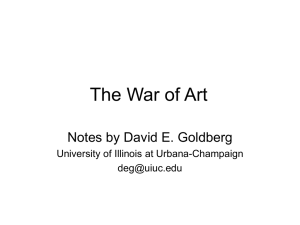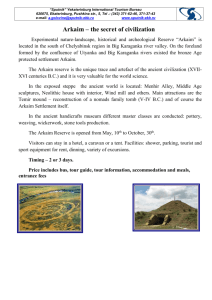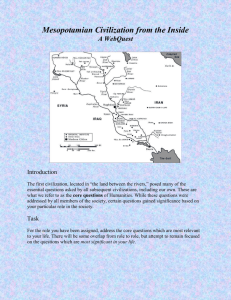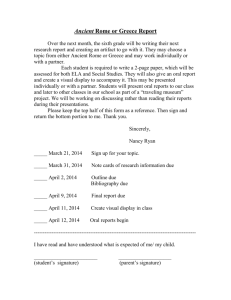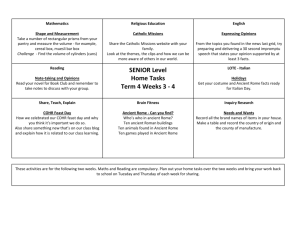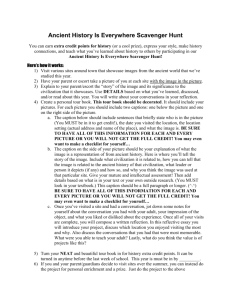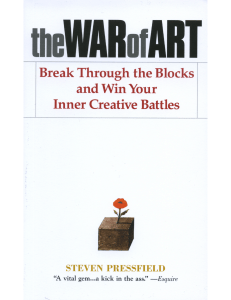WESTERN CIVILIZATION TO 1660 Dr. Morschauser Ext. 256
advertisement
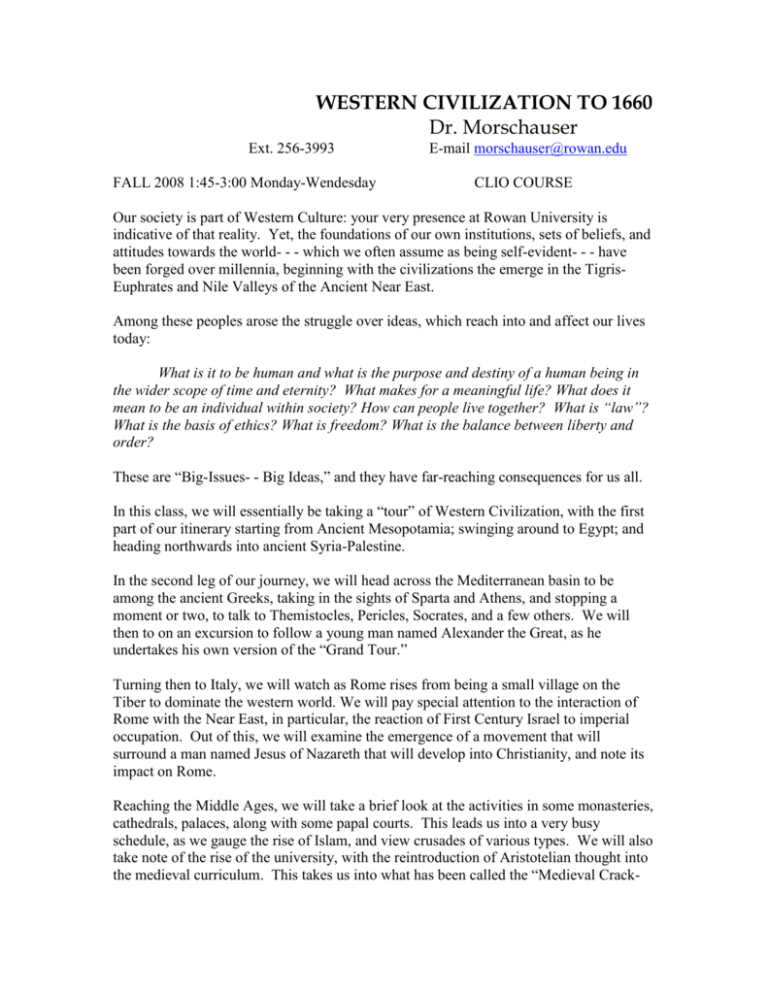
WESTERN CIVILIZATION TO 1660 Dr. Morschauser Ext. 256-3993 FALL 2008 1:45-3:00 Monday-Wendesday E-mail morschauser@rowan.edu CLIO COURSE Our society is part of Western Culture: your very presence at Rowan University is indicative of that reality. Yet, the foundations of our own institutions, sets of beliefs, and attitudes towards the world- - - which we often assume as being self-evident- - - have been forged over millennia, beginning with the civilizations the emerge in the TigrisEuphrates and Nile Valleys of the Ancient Near East. Among these peoples arose the struggle over ideas, which reach into and affect our lives today: What is it to be human and what is the purpose and destiny of a human being in the wider scope of time and eternity? What makes for a meaningful life? What does it mean to be an individual within society? How can people live together? What is “law”? What is the basis of ethics? What is freedom? What is the balance between liberty and order? These are “Big-Issues- - Big Ideas,” and they have far-reaching consequences for us all. In this class, we will essentially be taking a “tour” of Western Civilization, with the first part of our itinerary starting from Ancient Mesopotamia; swinging around to Egypt; and heading northwards into ancient Syria-Palestine. In the second leg of our journey, we will head across the Mediterranean basin to be among the ancient Greeks, taking in the sights of Sparta and Athens, and stopping a moment or two, to talk to Themistocles, Pericles, Socrates, and a few others. We will then to on an excursion to follow a young man named Alexander the Great, as he undertakes his own version of the “Grand Tour.” Turning then to Italy, we will watch as Rome rises from being a small village on the Tiber to dominate the western world. We will pay special attention to the interaction of Rome with the Near East, in particular, the reaction of First Century Israel to imperial occupation. Out of this, we will examine the emergence of a movement that will surround a man named Jesus of Nazareth that will develop into Christianity, and note its impact on Rome. Reaching the Middle Ages, we will take a brief look at the activities in some monasteries, cathedrals, palaces, along with some papal courts. This leads us into a very busy schedule, as we gauge the rise of Islam, and view crusades of various types. We will also take note of the rise of the university, with the reintroduction of Aristotelian thought into the medieval curriculum. This takes us into what has been called the “Medieval Crack- up,” with the rise of the Plague, the emergence of the nation-state, and the explosion of dissident movements of all sorts. The final leg of our journey, will lead us back to Italy, where we will hear about some of the artistic and intellectual achievements of the Renaissance- - perhaps pausing beneath the Sistine Ceiling, to watch Michelangelo for a moment or two. After an introduction to Humanism, we will end up across the Rhine, where we will be spending Halloween with Martin Luther. We will end our tour with an introduction to the “modern world,” which then picks up in Western Civ 2. “Activity Days” and “learning exercises” (a.k.a. tests) are periodically planned, whereby we will how much you have absorbed along the way. I. COURSE OBJECTIVES 1) To study and become familiar with the major political, social, and intellectual trends and foundational events which have created and affected Western culture during the period of c. 3000 BC(E)-1660 AD/CE. 2) To be enabled to think historically: seeing the origin, development, and relationship between ideas and events over time. 3) To be enabled to place recent events in our own time within a broader historical context. To related, compare, and contrast the problems of our current ae with the past. 4) To become acquainted with various types of history”: e.g. political history; social history; military history; intellectual history; private history. 5) To develop a critical view of historical sources and the problems of historiography by analyzing and interpreting primary texts. II. REQUIRED TEXT Kishlansky, ed., Sources of the West: Readings for Western Civilization, Vol. 1: From the Beginning to 1648. Stephen Pressfield, Gates of Fire Victor Davis Hanson, Carnage and Culture III. REQUIREMENTS 1) There will be 3 tests, along with a Comprehensive Final. The tests themselves will vary in format: the first tends to be more objective; the second, more of an imaginative use of history. The final will be a combination of objective and essay forms. 2) The student will write a critical book-review (6-10 pp.) of Hanson’s Carnage and Culture; details of which will be discussed during the semester. 3) The student will write an essay on Pressfield’s Gates of Fire. 4) During the semester, the student will write 3 brief, critical analyses and evaluations of original sources assigned by the professor. 5) The student’s grades will be comprised of the following: 3 tests (45%) + Final Exam (15 %) + Review (20%) + Analyses (15%) + class participation (5%). It is extremely important that you attend lectures and participate in class discussion, which is both encouraged and welcome. However, there will be no make-up texts without a legitimate excuse. Out of courtesy to other students and to the professor, all cell-phones must be turned off during class, and all students are expected to be on time. Also, please inform the professor if you have any medical problem that necessitates your leaving during the period. Likewise, the class is at 12:15 AM: please make sure that you develop a traveling schedule that allows you to come to class on time. Dr. Morschauser’s office hours are Mon-Wed 8:30-9:25 AM; 10:40-12:15 AM; Tuesday, 8:30-9:25 AM. Other times by appointment. If you are having difficulties, have questions, or are experiencing personal problems that are interfering with your class-work, please let the professor know immediately. IV. TENTATIVE COURSE READINGS AND ASSIGNMENTS Week 1 Introduction: Ancient Mesopotamia 2 Sources: Gilgamesh; Creation Epic; Code of Hammurabi. 3 Book of the Dead 4 Exodus; Isaiah TEST 1 5 The Iliad (We will begin reading and discussing Carnage and Culture; which will continue throughout the semester.) 6 The Apology 7 The Republic; The Politics; Have Pressfield’s book read before the 2nd test. TEST 2 8 The Laws; The Aeneid 9 The Life of Augustus; Sermon on the Mount TEST 3 10 The Germania; The City of God; the Rule 11 Code; the Secret History; the Koran 12 The Burgundian Code; Life of Charlemagne 13 Feudal Documents; Magna Carta; Summa Theologica. 14 The Divine Comedy 15 The Life of Leonardo; the Prince 16 In Praise of Folly; The Freedom of the Christian; Utopia; Admonition to Peace FINAL EXAM; FINAL PAPER

